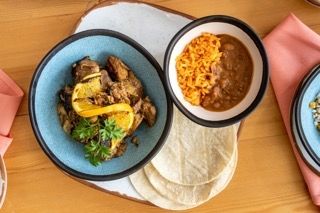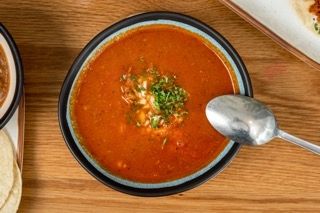Is Mexican Food Healthy? Unpacking the Nutritional Advantages of Traditional Ingredients
The inquiry of whether Mexican food is healthy and balanced welcomes an exploration of its standard active ingredients. Beans and corn work as fundamental staples, abundant in protein and fiber. Avocados give useful fats, while various herbs and seasonings include taste and health and wellness benefits - hand crafted margarita. Together, these elements produce a tapestry of nourishment. Nonetheless, the healthfulness of Mexican food usually depends on preparation methods and part dimensions. What duty do these variables play in identifying its general dietary worth?
The Power of Beans: Healthy Protein and Fiber-Rich Staples
Although often neglected, beans function as a cornerstone of Mexican cuisine, offering a wealth of nutritional advantages. Rich in healthy protein, they are an exceptional plant-based option for those looking for to satisfy their nutritional healthy protein requires. This high healthy protein material supports muscle repair and development, making beans important for both vegetarians and meat-eaters alike. Furthermore, beans are an exceptional source of nutritional fiber, which assists in food digestion and advertises a sensation of fullness, potentially aiding with weight administration.
The range of beans used in Mexican dishes, such as black beans, pinto beans, and kidney beans, adds to a varied taste account and can enhance dishes nutritionally. Beans are reduced in fat and have necessary vitamins and minerals, consisting of magnesium, iron, and folate. With each other, these characteristics make beans an essential ingredient, providing both nutrients and nutrition in traditional Mexican fare.

Corn: a Versatile Grain With Nutritional Advantages
Corn attracts attention as a versatile grain fundamental to Mexican food, commemorated not just for its cooking applications yet additionally for its remarkable nutritional account. As a primary active ingredient in recipes like tortillas, tamales, and pozole, corn supplies vital nutrients that contribute to a balanced diet. Rich in carbs, it acts as a substantial energy source, while also being low in fat, making it a desirable option for different nutritional needs.
Corn is a good resource of dietary fiber, which aids in food digestion and promotes satiety. It consists of significant quantities of vitamins such as B-complex vitamins, which are crucial for basal metabolism. The visibility of antioxidants, specifically carotenoids, adds to general health and wellness by decreasing oxidative stress. Additionally, corn is gluten-free, catering to those with gluten sensitivities. On the whole, the dietary benefits of corn highlight its significance in conventional Mexican food and its function in a healthy diet plan.
Avocados: Healthy Fats and Nutrients in Every Bite
Avocados play a substantial role in Mexican food, enhancing dishes with their velvety structure and abundant flavor. Past their culinary charm, avocados are celebrated for their excellent nutritional account. They are a rich source of healthy and balanced monounsaturated fats, which can aid lower negative cholesterol levels and support heart health and wellness. Furthermore, avocados are loaded with essential nutrients, consisting of potassium, vitamin E, and B vitamins, adding to general wellness.
The high fiber web content in avocados help digestion and promotes satiation, making them a useful enhancement to any type of meal. Their special nutrient structure can also sustain skin wellness and offer anti-inflammatory advantages. Incorporating avocados right into standard Mexican dishes or appreciating them as a standalone snack can improve both taste and nourishment, demonstrating why they are a beloved staple in Mexican cuisine. Overall, avocados offer a scrumptious means to enjoy healthy and balanced fats and crucial nutrients in every bite.

Flavors and Herbs: Flavorful Health And Wellness Boosters
While appreciating the abundant tastes of Mexican food, one can not forget the crucial role that you can find out more spices and natural herbs play in enhancing both preference and health. Active ingredients such as cilantro, oregano, and chili peppers not just add to the vibrant flavor account but additionally give significant health and wellness advantages. Cilantro is recognized for its detoxifying homes, assisting to get rid of heavy steels from the body, while oregano is packed with anti-oxidants and possesses anti-inflammatory effects.
Chili peppers, a staple in many Mexican recipes, include capsaicin, which has been linked to enhanced metabolic process and discomfort relief. Furthermore, flavors like cumin and coriander support digestion and may aid in blood glucose law. Including these flavorful wellness boosters into dishes not only enhances the cooking experience yet also advertises total well-being, making Mexican cuisine not just delicious, yet additionally nutritionally useful.
Conventional Food Preparation Techniques: Enhancing Nourishment and Flavor
Typical food preparation techniques in Mexican food play a crucial duty in improving both nutrition and flavor, as they typically prioritize fresh components and time-honored strategies. Methods such as nixtamalization, where corn is saturated and cooked in an alkaline option, not just enhance the nutrient profile of tortillas however likewise enhance their digestibility - churros. Furthermore, the use of sluggish food preparation techniques, like stewing or braising, permits tastes to meld wonderfully while keeping the stability of the active ingredients

Frequently Asked Concerns
Are Mexican Food Portions Commonly Larger Than Various Other Foods?
Mexican food sections are often bigger than those of numerous various other cuisines. This characteristic mirrors typical eating practices, stressing common sharing and hearty dishes, which can lead to a more significant serving dimension in general.
Just how Does the Prep Work Approach Affect Healthiness of Mexican Food?
Preparation approaches substantially affect the healthiness of Mexican food. Methods such as cooking or steaming maintain nutrients, while frying can boost harmful fat content. Selections of active ingredients and cooking styles ultimately figure out overall dietary worth.
Can Mexican Food Be Tailored for Certain Nutritional Limitations?
Mexican food can undoubtedly be customized for details dietary restrictions. Alternatives, such as utilizing corn tortillas for gluten-free diet regimens or incorporating even more vegetables, allow people to appreciate standard flavors while suiting numerous nutritional needs.
What Are Usual False Impressions Regarding Mexican Food and Health?
Typical mistaken beliefs concerning Mexican food include the belief that it is inherently why not look here undesirable, excessively hot, and exclusively concentrated on fats. In truth, conventional meals typically include nourishing ingredients and can be customized to different nutritional requirements.
Are There Much Healthier Choices at Mexican Dining Establishments?
Healthier choices at Mexican restaurants typically consist of grilled meats, beans, and fresh vegetables. Selecting recipes that emphasize whole components and avoiding hefty sauces can result in a much more healthy eating experience, advertising general well-being.
The selection of beans utilized in Mexican recipes, such as black beans, address pinto beans, and kidney beans, adds to a diverse flavor account and can boost dishes nutritionally. Avocados play a substantial duty in Mexican food, complementing meals with their creamy appearance and abundant flavor. Integrating avocados right into typical Mexican recipes or enjoying them as a standalone snack can boost both flavor and nourishment, demonstrating why they are a precious staple in Mexican cuisine. While appreciating the rich flavors of Mexican cuisine, one can not ignore the necessary role that spices and herbs play in improving both taste and health. Conventional cooking approaches in Mexican food play a vital duty in enhancing both nourishment and taste, as they often prioritize fresh active ingredients and classic techniques.